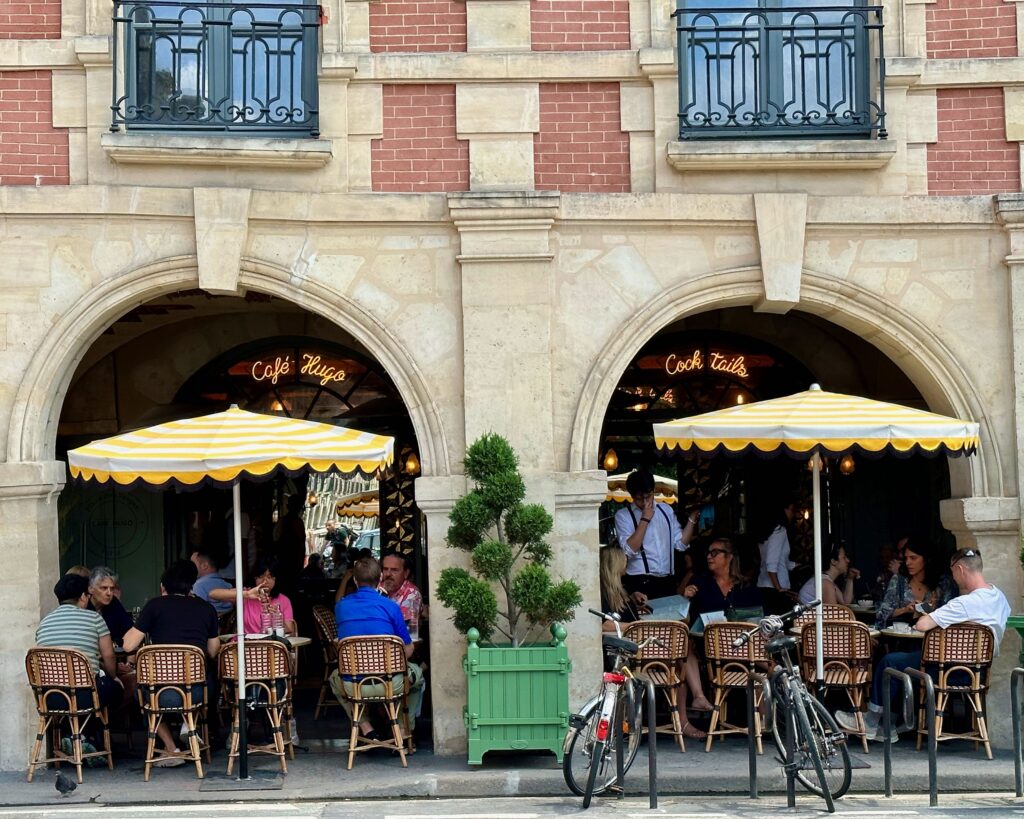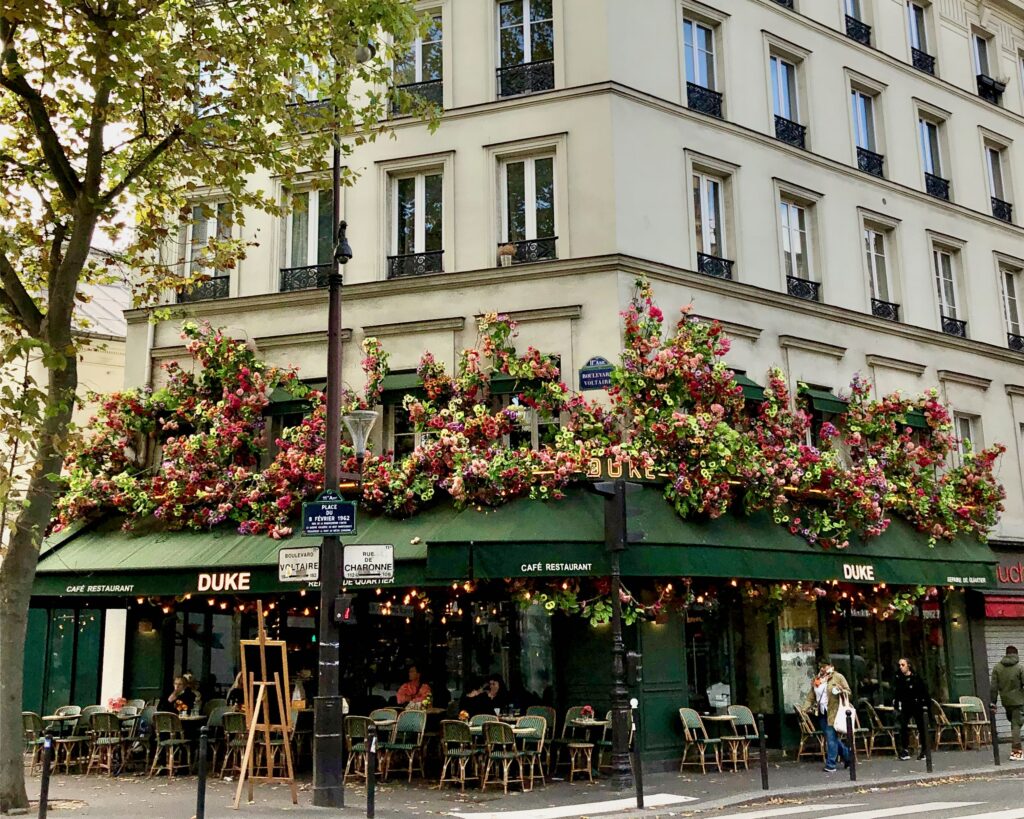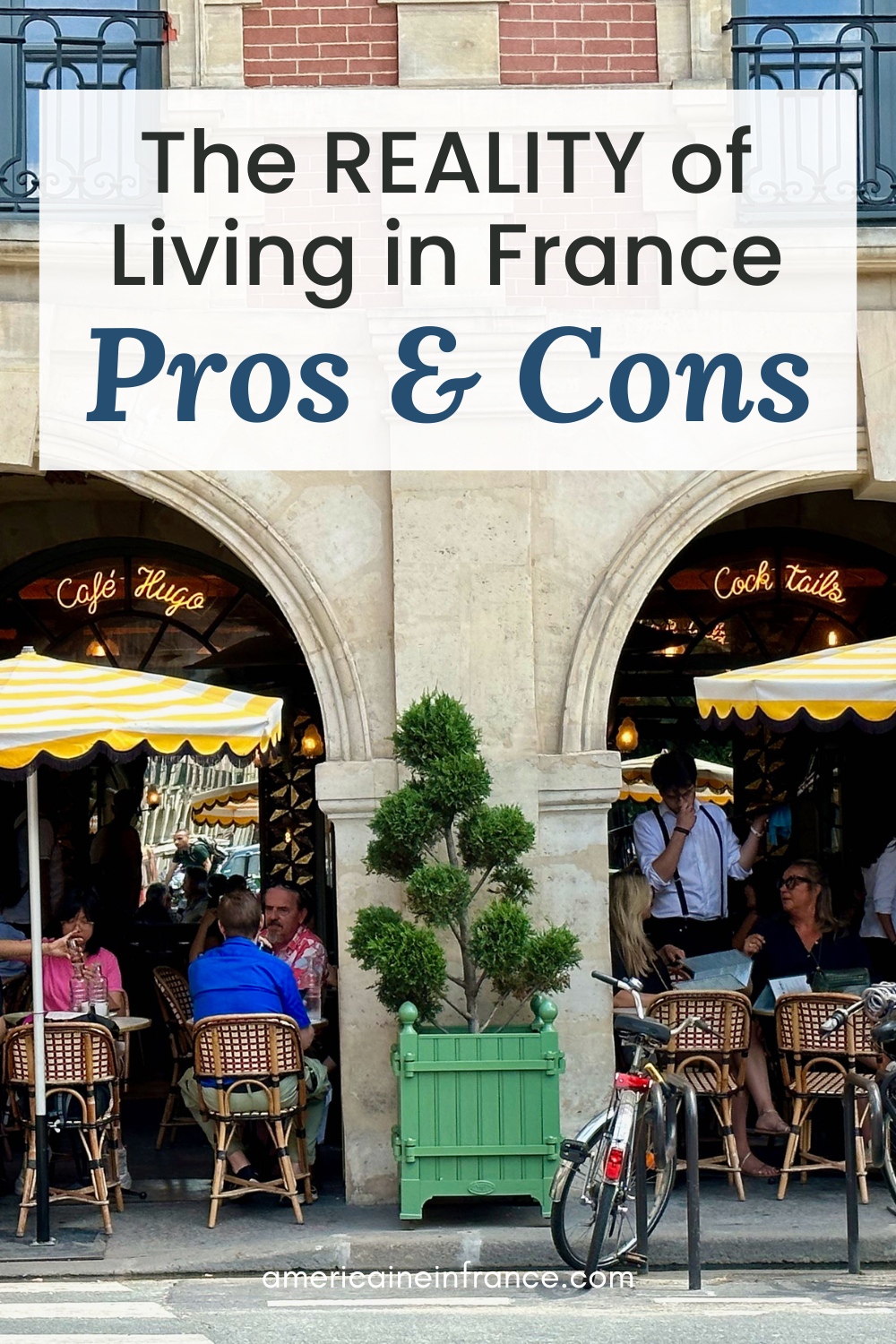This post may contain affiliate links, meaning that if you click and make a purchase, I may earn a commission at no additional cost to you. Read the full disclosure here.
Wondering if France is a great place to live?
There are pros and cons everywhere and France is no exception. Out of fairness, I’ve put together a list of positive and negative aspects of life in France to encompass both sides to this discussion. You can’t talk about the advantages without mentioning the disadvantages!
These are things that have stood out to me based on my experiences as an American living in France. An upside for me might be viewed as a downside for you or vice versa, so I’d love to hear what you think after having a read!

Pros to Living in France
- Healthcare accessibility: Public healthcare in France is considered a basic right for all. Everyone residing in France can benefit from the national healthcare program. Furthermore, medical expenses are relatively affordable, and there is transparency around the cost of care.
Related: Pros & Cons of the French Healthcare System
- Free public education: Education is compulsory in France from the age of 3, so kids in France have access to free public education starting at this age. This is certainly an advantage for parents who would otherwise need to pay for childcare.
- Affordable further education: Going to university in France will generally not require the sale of your kidneys. Compared to colleges in the United States, the cost for higher education is relatively low here.
- Parental leave: Working mothers giving birth are entitled to at least 16 weeks of maternity leave. Fathers (and/or partners to the mother of the baby) are entitled to 25 days of paternity leave from work. Parental leave is paid. Leave is also offered in the case of adoption. There are, of course, other nuances to parental leave in France (particularly if you are self-employed) but this is commonly how it works in most cases.

- Cheese, bread, & wine: I don’t think I actually need to explain this one?
Related: 7 Everyday Things in France That Feel Like a Luxury
- Seasonal eating: There is an emphasis in France on eating fresh and local foods. At food markets, for example, it’s required for vendors to indicate where produce is coming from. It’s uncommon to see produce being sold out of season. Living in the United States, I never questioned strawberries or blueberries in the dead of winter.
- Quality food: There is a startlingly large list of food ingredients that are banned in France because they are considered not good for your health yet they are allowed in food in the United States.

- Varied landscape: Most people immediately think of Paris when they think of France, but there is so much to see outside of the capital. France truly has a little bit of everything: beaches, countryside, cities, mountains, rivers, dunes, etc.
- Travel ease: Due to its location within the EU, you can easily get to many other countries through various modes of transport. France is a major travel hub.
- Work/life balance: Vacation and leisure time are viewed as important aspects of life and are, therefore, prioritized. Taking time off from work is even typically encouraged (unless you’re my husband who’s the CTO of a start-up 🙃). Here in France, it’s about working to live, not living to work.

- Cost of living: All things considered, France is an affordable place to live. People aren’t generally in debt here. Credit cards aren’t even really a thing. That’s not to say that there aren’t people in France dealing with bank overdrafts and/or financial insecurity because there certainly are people here who struggle to make ends meet.
- Job security: Due to strict dismissal procedures, it is rather hard to be fired in France. We’ll put this as a pro from the employee standpoint because if you’re on the manager side of things, you might not consider it as such 😅
- Minimum wage: There is a regulated minimum wage throughout the country. No one can be paid below the minimum wage.
- Housing security: It’s pretty hard for landlords to kick renters out of an apartment or house. (Which is why there is a real problem with squatters in France!)
Cons to Life in France
- Store hours: Businesses open later than what I’m used to. Hardly anything can be accomplished before at least 9 am, which has been a hard adjustment for an early bird like me who likes to get my errands done in the morning. Additionally, stores close early and have inconsistent hours. They might be closed for a one or two-hour lunch break, for example. (Ok, I’ll admit it—My American-ness is on full display here 😅)
- August: It can feel like the country comes to a standstill business-wise in France over the summer, particularly during the month of August. Many people take vacation at this time. The préfecture and all French admin offices experience higher-than-usual delays and your doctor may be away for 3-4 weeks straight. It can be an uneasy time if you are in immigration limbo or have a medical need that requires follow-up.

- Late adopters to technology: France has been slow to adapt to technology in government and in business. Government websites in particular aren’t updated regularly. My theory is that they are trying to keep people employed by allotting them tasks that could have been automated by now 😉
- Bureaucracy & administrative “loops”: I’ll just give one famous example… In order to rent an apartment in France, you need a French bank account. In order to have a French bank account, you need to have a French address… You could be stuck here for a while going back and forth until you find someone who will help you out. Tackling paperwork in France is a major challenge.
- Banking: Banking is super antiquated in France. It blows my mind how expensive it is to have a French bank account even though they’re the ones holding onto your money. Furthermore, you’re tied to a specific branch for certain procedures, your account gets flagged if you move a “large” sum of money, the phone apps are terrible and glitchy, and you often have to call your advisor to do a procedure for you when the phone app doesn’t work and then they have the audacity to charge a commission. EYE ROLL.

- Slow social systems: I appreciate many of the systems that the government has in place to help out people who live here. There is a lot of assistance and resources for many situations. However, navigating the procedures can be really overwhelming and time-consuming. It can take a while before you’re in the system and able to benefit even when you qualify and are urgently in need.
- High taxes & social charges: That great universal healthcare has to come from somewhere! French fiscal residents pay a number of taxes and social charges. The amount you contribute to social services is substantial and increases with your income.
- Entering the job market as an immigrant: Many employers in France place a significant emphasis on possessing a degree from a French university as well as having a high command of the French language (even if the job’s role does not entail much French use at all). Additionally, getting your foreign diploma and/or credentials recognized can prove difficult and sometimes, impossible, depending on your field. This forces many otherwise qualified immigrants to look for jobs that don’t put their best skills to use. Landing a job in France is not unattainable as an immigrant, but there are some serious hurdles.
- Minimum wage: While it’s great that there is a standard minimum wage, this amount is a low income. As such, it can be difficult to live off of this wage in major cities, like Paris.

- “C’est pas possible”: If you’ve never heard this expression, you either haven’t lived in France and/or you just haven’t been here long enough. Not only does everything take forever, it’s often “not possible.” No, the client is not king here!
- Language barrier: Not knowing French can really hinder your experience in France, from following up with paperwork to going about your daily life. Outside of Paris and touristy areas, English isn’t spoken as much or at least not generally to a degree that is necessary to attain information about complicated subjects such as taxes and residence permits.
- Transportation can be expensive: Public transportation infrastructure is relatively good, but metro ticket prices keep going up and high-speed trains can be costly. In terms of private transportation, when driving long distances, you’ll likely encounter steep tolls and high gas prices.

- Medical deserts: Throughout France, there is a doctor shortage resulting in long wait times for many specialists. Outside of major cities, it can be hard to even find a general doctor who is accepting new patients and will allow you to declare them as your médecin traitant.
- Smoking & vaping: France still has a long way to go with these popular pastimes. Not fun for those of us who hate being enveloped in cigarette smoke!
What aspects of life in France would you add to this quick list of pros and cons?
If you liked this post, you might also want to check out my list of pros and cons for Paris!

Hmmm… how about friendliness of the French towards Americans? I’ve heard that while Parisians can be brusque, people elsewhere are helpful to strangers.
Parisians can be quite brusque on the streets, but in my opinion, this is similar to residents in any major city. As far as being identified as an American while in France, I’ve largely had positive experiences and reactions from French people in regards to my nationality 🙂